For many of us, the dream of owning a farm takes a while. There’s property to purchase, things to save for, job positions to consider, current living conditions to sell, contracts to fulfill…it can seem like it’s taking forever to get to finally get to your homestead.
This “waiting for your life to begin” can take a toll on your patience. Before we were able to buy our farm we would sometimes just drive up to the local feed store and look at all the “farm stuff”. It was a tiny quench for the thirst of homestead living. We also took this time to learn as much as we possibly could about all the things we wanted to do with our homestead. We watched You Tube videos, attended conferences, fairs, read blogs and books….many, many books. And I’m so glad we did! Because once you have a farm you will be spending your time building fences, repairing out-buildings, and getting things going. It’s good to have the knowledge to be able to jump right in.
A lot of what you need to learn will depend on what area of homesteading you plan to get into. A lot of these activities can be started even if you live in an apartment. A few herbs on a windowsill can be a great teaching experiment.
Even small endeavors will inspire you to want to try and learn more. Here are X things to research and explore while you wait for your homestead.
- The basics of gardening
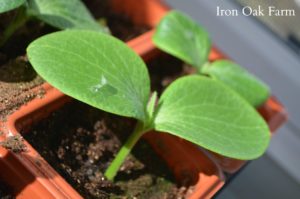 The garden is at the hub of the homestead. Understanding planting times for your area, what plants are suitable for your climate, what plants can be direct sown and which ones need to be started in the house early. You can also begin collecting gardening supplies like reusable seed trays, starting pots and a good source of soil/compost.
The garden is at the hub of the homestead. Understanding planting times for your area, what plants are suitable for your climate, what plants can be direct sown and which ones need to be started in the house early. You can also begin collecting gardening supplies like reusable seed trays, starting pots and a good source of soil/compost.
- Food preservation
 Canning, dehydrating, blanching vegetables for the freezer are all skills that will help you in your homestead. Even a small garden can often produce enough vegetables to make it difficult for one family to eat before spoiling. Learning how to store these foods is essential. Start by visiting your farmers markets and stocking up on what’s in season. Learn how to preserve it now.
Canning, dehydrating, blanching vegetables for the freezer are all skills that will help you in your homestead. Even a small garden can often produce enough vegetables to make it difficult for one family to eat before spoiling. Learning how to store these foods is essential. Start by visiting your farmers markets and stocking up on what’s in season. Learn how to preserve it now.
- Cooking from scratch
 Seasonal cooking or using what’s coming in from the garden to base your meals around takes some getting used to. We used to revolve our meals around the protein and then use vegetables as a side dish. Now we start with what we have coming in from the farm…eggs, zucchini, etc. and make that the hub of the meal. You also need to get creative with using the same one ingredient in different ways so you don’t experience burnout when something is abundantly in season. For example, we are in pumpkin and squash season. Learning to make pumpkin soup, pumpkin bread, pumpkin butter, pumpkin pie, and roasted pumpkin will put the produce to good use in a variety of flavors.
Seasonal cooking or using what’s coming in from the garden to base your meals around takes some getting used to. We used to revolve our meals around the protein and then use vegetables as a side dish. Now we start with what we have coming in from the farm…eggs, zucchini, etc. and make that the hub of the meal. You also need to get creative with using the same one ingredient in different ways so you don’t experience burnout when something is abundantly in season. For example, we are in pumpkin and squash season. Learning to make pumpkin soup, pumpkin bread, pumpkin butter, pumpkin pie, and roasted pumpkin will put the produce to good use in a variety of flavors.
- Poultry basics
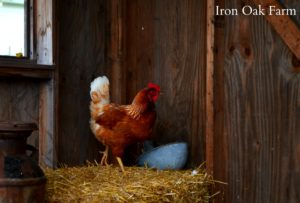 Chickens are one of the easiest and most common homesteading animals to raise. Learn what you need to start a flock now so you’re ready when the time comes. Read about coops especially. The coop is the biggest investment so you want to do it right the first time.
Chickens are one of the easiest and most common homesteading animals to raise. Learn what you need to start a flock now so you’re ready when the time comes. Read about coops especially. The coop is the biggest investment so you want to do it right the first time.
- Animal care basics
 Depending on the kind of homestead you plan on having, learning about the animals you want to raise, can be a great advantage. You can also contact breeders and find out of there is a waiting list that you need to join to purchase some of their animals. Research housing, feed fencing, local veterinary care and the specific needs of that animal.
Depending on the kind of homestead you plan on having, learning about the animals you want to raise, can be a great advantage. You can also contact breeders and find out of there is a waiting list that you need to join to purchase some of their animals. Research housing, feed fencing, local veterinary care and the specific needs of that animal.
- Animal processing
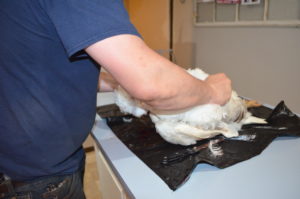 If you decide to raise animals for consumption, learn the process of keeping the integrity of the meat and humane practices. See if there are local butchering classes in your area or find a farmer that will let you come help on processing day.
If you decide to raise animals for consumption, learn the process of keeping the integrity of the meat and humane practices. See if there are local butchering classes in your area or find a farmer that will let you come help on processing day.
- Aspects of dairy
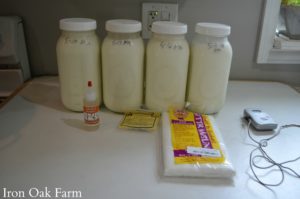 If you plan to add dairy goats or a cow to your homestead now is the time to learn about dairy production. Read about the benefits of raw versus pasteurized milk, learn how to handle the milk in a sanitary way and how to make useful products from it like yogurt, cheese, butter, kefir etc. You will also have to have a plan for the offspring that dairy animals birth each year.
If you plan to add dairy goats or a cow to your homestead now is the time to learn about dairy production. Read about the benefits of raw versus pasteurized milk, learn how to handle the milk in a sanitary way and how to make useful products from it like yogurt, cheese, butter, kefir etc. You will also have to have a plan for the offspring that dairy animals birth each year.
- Beekeeping
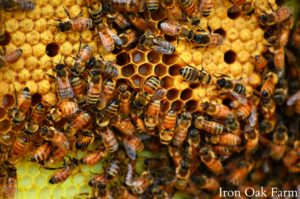 Beekeeping is a wonderful addition to the farm. It provides a natural sweetener, higher pollination yields, and a possible income. For me, beekeeping is the most challenging but most fascinating aspects of our farm.
Beekeeping is a wonderful addition to the farm. It provides a natural sweetener, higher pollination yields, and a possible income. For me, beekeeping is the most challenging but most fascinating aspects of our farm.
- Homemade cleaners and cosmetics
 A basic lye soap recipe and learning how to execute it can be a great addition to any homesteading arsenal. Also learning how to make homemade cleaning products and cosmetics can not only help you save money but can be a healthier more natural alternative. It can also help you to use up products that are grown on your farm. Herbs, goat milk, tallow, honey etc. can all be used.
A basic lye soap recipe and learning how to execute it can be a great addition to any homesteading arsenal. Also learning how to make homemade cleaning products and cosmetics can not only help you save money but can be a healthier more natural alternative. It can also help you to use up products that are grown on your farm. Herbs, goat milk, tallow, honey etc. can all be used.
- Mending, sewing, knitting crocheting
 These skills are not necessarily a “must-learn” on the homestead, though being able to mend an expensive pair of Carhartt overalls can definitely be a money saver. But lots of times when you have a homestead you realize that it touches every aspect of your life. You may find that you’re too tired at night to go out and “party” like you used to. Quiet, relaxing hobbies tend to creep into the homesteading life. Also, I feel like once you begin to do things for yourself it becomes addictive and crafts like knitting, sewing, quilting and the like become something that fits into this lifestyle. It’s also a great past time in the winter when the homestead settles down for the year.
These skills are not necessarily a “must-learn” on the homestead, though being able to mend an expensive pair of Carhartt overalls can definitely be a money saver. But lots of times when you have a homestead you realize that it touches every aspect of your life. You may find that you’re too tired at night to go out and “party” like you used to. Quiet, relaxing hobbies tend to creep into the homesteading life. Also, I feel like once you begin to do things for yourself it becomes addictive and crafts like knitting, sewing, quilting and the like become something that fits into this lifestyle. It’s also a great past time in the winter when the homestead settles down for the year.
- Vehicle care
 When you begin a homestead, you may find that you’re harder on your vehicles. Dirt roads, hauling feed and hay and landscape supplies in the bed of your truck can take its toll. You might also find that things you may have had professionally serviced no longer fit into your budget. This includes vehicle care. Changing your own oil and starting with a basic understanding of how an engine works is a good start. Learning how to replace simple things like belts, air filters, spark plugs is good as well. You will also need to learn to care for any equipment that you may be using on the farm. Rototillers, mowers, tractors and tractor implements.
When you begin a homestead, you may find that you’re harder on your vehicles. Dirt roads, hauling feed and hay and landscape supplies in the bed of your truck can take its toll. You might also find that things you may have had professionally serviced no longer fit into your budget. This includes vehicle care. Changing your own oil and starting with a basic understanding of how an engine works is a good start. Learning how to replace simple things like belts, air filters, spark plugs is good as well. You will also need to learn to care for any equipment that you may be using on the farm. Rototillers, mowers, tractors and tractor implements.
- Basic carpentry and home improvement skills
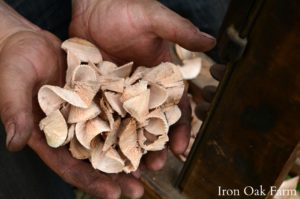 Mending fences, constructing coops, building hay feeders and nest boxes are all part of daily farm life. Learn to use a miter saw, a table saw, drill, hammer, staple gun, tape measure and level at the very minimum.
Mending fences, constructing coops, building hay feeders and nest boxes are all part of daily farm life. Learn to use a miter saw, a table saw, drill, hammer, staple gun, tape measure and level at the very minimum.
- Tool care
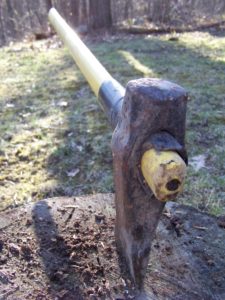 Taking proper care of your tools will save you frustration, time and money on the homestead. Learn how to change a chainsaw blade, how to sharpen an ax, change the oil on your mower, mix gas for things like your weed whacker and how to properly store immobile tools.
Taking proper care of your tools will save you frustration, time and money on the homestead. Learn how to change a chainsaw blade, how to sharpen an ax, change the oil on your mower, mix gas for things like your weed whacker and how to properly store immobile tools.
Take your time learning new skills and take each thing one at a time. When you master it, move on to the next thing. By the time you have your farm, you will be well versed in many aspects of farming life.











2 Comments
Hello I’m in Kenya with a farm would like to strat homesteading have a family, few cows and donkeys is there any one we can co- homestead together
Love first two articles I’ve read about your angora goats and homesteading considerations! Thanks!